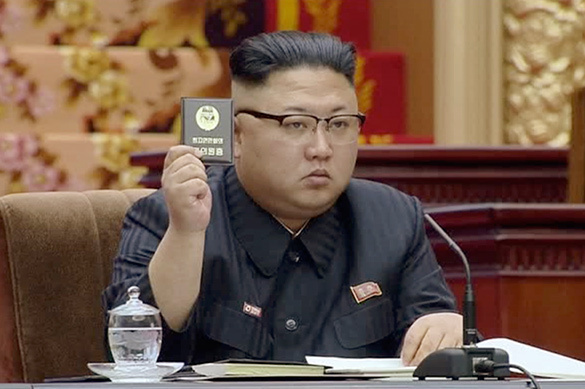The US dropping its largest non-nuclear bomb in Afghanistan is being interpreted as the latest warning sign, as Washington has been ratcheting up pressure over Pyongyang’s nuclear threats, especially since the US’ recent summit with China.
The US Air Force released the GBU-43/B Massive Ordnance Air Blast bomb, armed with 11 tons of explosives, in the eastern part of Afghanistan on Thursday on a cave complex that housed fighters of the Islamic State extremist group.
 |
An undated handout photo made available by the US Department of Defense shows a GBU-43 Massive Ordnance Air Blast at the Eglin Air Force Armament Center, Florida, USA. (EPA-Yonhap) |
The bombing came amid spiraling tension on the peninsula. The North was deemed to have completed preparations for another underground detonation, possibly to coincide with the birthday of late national founder Kim Il-sung on Saturday, while a US air carrier strike group is en route to South Korea after altering its initial itinerary from Singapore to Australia. A senior North Korean official on Friday threatened a pre-emptive strike on the US and a fresh nuclear test.
US President Donald Trump did not say the use of the “mother of all bombs” was intended to send a message to Pyongyang, noting he has given the military “total authorization.” But he once again stressed the gravity of the North Korean nuclear issues, expressing confidence Chinese President Xi Jinping will work to resolve them.
“I don’t know if this sends a message. It doesn’t make any difference if it does or not. North Korea is a problem. The problem will be taken care of,” Trump told reporters in the White House shortly after the bombing.
“I will say, I think China has really been working very hard. I have really gotten to like and respect, as you know, President Xi. He’s a terrific person. We spent a lot of time together in Florida. And he’s a very special man. So we’ll see how it goes. I think he’s going to try very hard.”
Earlier on Twitter, Trump reiterated that if Beijing fails to rein in Pyongyang, it would take action in partnership with its allies.
“I have great confidence that China will properly deal with North Korea. If they are unable to do so, the US with its allies, will! U.S.A.,” he wrote.
Speculation has been rising that the US may be preparing to launch a pre-emptive strike against the North, in particular since its strike on Syria and the strike group’s diversion last week.
 |
North Korean leader Kim Jong-un (AP-Yonhap) |
NBC News early Friday reported the US is ready for a strike, having positioned two destroyers capable of shooting Tomahawk cruise missiles, one just 480 kilometers from the North’s nuclear test site, as well as bombers in Guam, citing multiple senior intelligence officials.
Agence France-Presse quoted a White House foreign policy adviser as saying that another provocation is a matter of “when,” not “if,” and military options are already being assessed.
A pre-emptive attack remains a long shot, given risks of escalation into a full-fledged war and challenges associated with detecting nuclear and missile facilities. But the recent series of US actions has prompted fiery reactions from the Kim Jong-un regime.
In an interview with the Associated Press in Pyongyang on Friday, North Korean Vice Foreign Minister Han Song-ryol warned Washington against military provocations, blaming Trump for creating a “vicious cycle” of tensions, such as through “aggressive” tweets. A nuclear test could take place at a time and at a place where the leadership deems necessary, he said.
“If the US comes with reckless military maneuvers then we will confront it with the DPRK’s pre-emptive strike,” Han said, referring to the country’s official name, the Democratic People’s Republic of Korea.
“We’ve got a powerful nuclear deterrent already in our hands, and we certainly will not keep our arms crossed in the face of a US pre-emptive strike.”
With tension flaring up, Chinese Foreign Minister Wang Yi warned of a military clash, calling for dialogue as the “only possible solution.”
“Lately, tensions have risen with the US and the ROK (South Korea) on one side, and the DPRK on the other, and one has the feeling that a conflict could break out at any moment,” Wang said at a joint news conference with his French counterpart Jean-Marc Ayrault in Beijing later in the day.
“If a war occurs, the result is a situation in which everybody loses and there can be no winner.”
The South Korean military said it is closely monitoring any development from across the border, assessing the North is capable of detonating a device at the northern or southern portals of the Punggye-ri nuclear complex. Col. Roh Jae-cheon, spokesperson of the Joint Chiefs of Staff, said Friday the explosion could take place at any time, though it has not detected any clear signs of an imminent blast.
“I think the Trump administration is trying to place maximum pressure, following through on what was discussed during his summit with Xi,” a senior official at Seoul’s Foreign Ministry said, requesting anonymity due to the sensitivity of the matter.
“This weekend could set the tone for the situation going forward. If the North opted not to conduct a nuclear test or other major provocation, the atmosphere may quickly turn around in a way that defuses tension.”
By Shin Hyon-hee
(
heeshin@heraldcorp.com)












![[Today’s K-pop] Blackpink’s Jennie, Lisa invited to Coachella as solo acts](http://res.heraldm.com/phpwas/restmb_idxmake.php?idx=644&simg=/content/image/2024/11/21/20241121050099_0.jpg)
